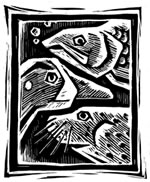- Home
- Restoration Projects
- Project Search
- HRM Program: What is the age at first spawning for female herring in PWS? 13120111-J
Project Information
Title: HRM Program: What is the age at first spawning for female herring in PWS? 13120111-J
Project Year and Number: 2013: 13120111-J
Other Fiscal Years and Numbers for this Project: 2012: 12120111-J
Principal Investigator (PI): Ron Heintz
Managing Agency: NOAA
Assisting Personnel: None
Project Website: https://pwssc.org/reproductive-maturity-of-pacific-herring/
Research Location: Prince William Sound
Restoration Category: Research
Injured Resources Addressed: Not Specified
Abstract:The predictive capabilities of current population models of herring in Prince William Sound may be improved by validating the estimated proportions of fish in each age class that spawn and knowing the proportions of primiparous individuals in each age class. Determination of age at first spawn has been accomplished via 1) analysis of differential growth increments on scales, 2) histological analysis of egg development in ovaries. While the histological method provides direct observation of the spawning history of individuals it is unlikely that developing oocytes can be observed among spawners. Hence the histological analysis must occur some months after spawning. We propose to examine scales of female herring collected from spawning aggregates in PWS to identify the spawning history of each year class. We will also validate the scale technique by comparing the results of scale analysis with that of histological analysis of oocyte development. The validation will likely be used on fish sampled some time after spawning. In order to identify the optimal time we will iteratively sample ovaries in fish held in the lab after spawning. Estimates of the proportion of primiparous fish in the spawning population will provide a means for adjusting estimates of the total post-spawning biomass in the ASA by indicating proportion of each age class that was not on the spawning grounds in the previous year. This study will consequently serve to develop an inexpensive method for improving the accuracy of spawning stock biomass estimates.
Proposal: View (1,324 KB)
Reports:
Final Report: View (747 KB)
Publications from this Project: None Available
